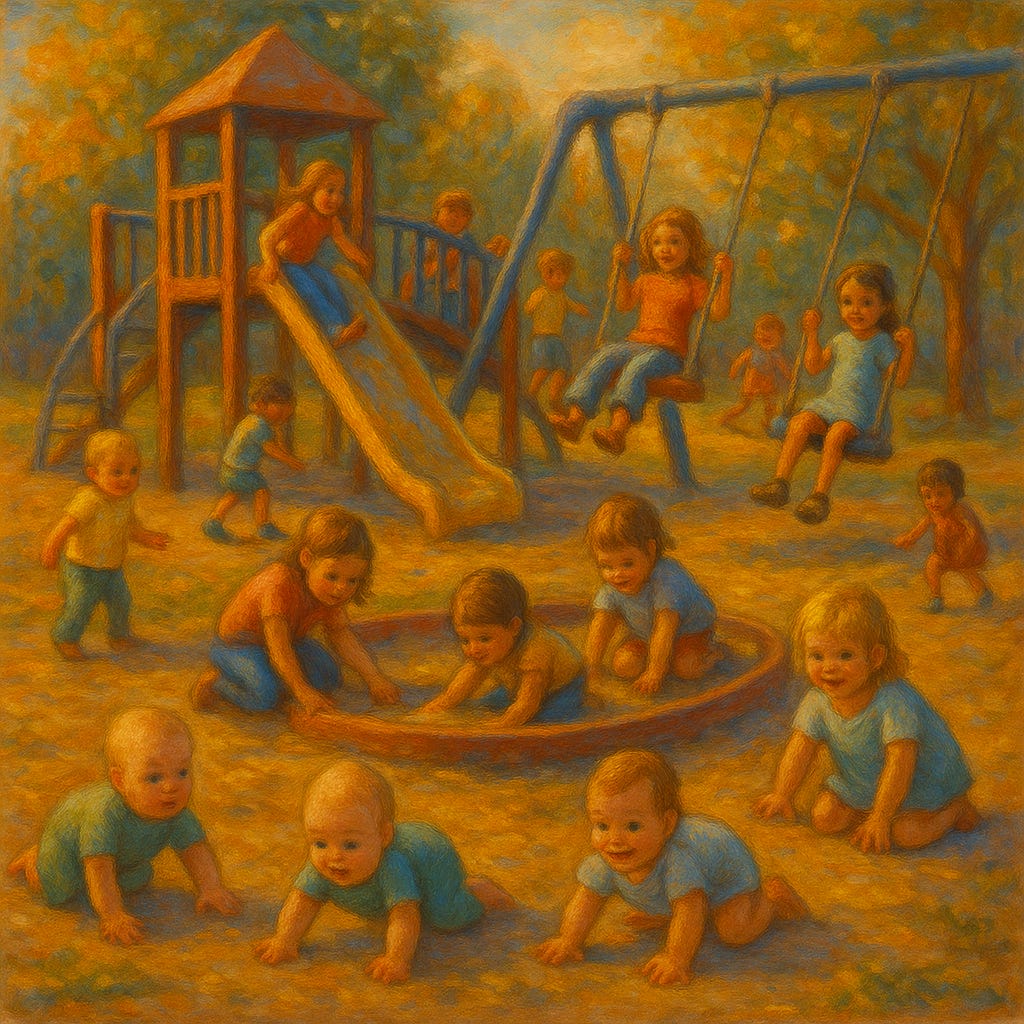Hi, I’m Aastha, and welcome to my world of words. I write about education, human creativity, and any other words I bob my head to. I also write a longevity and health newsletter called Live Longer World.
I was having a conversation with a friend who mentioned “I was reading an article discussing how we should lets kids struggle a bit when they’re playing so they can be ready for the real world.”
Adults want an education system that will prepare kids for the “real world”. Have we stopped to wonder what that means? Is the world that kids inhabit fake then?1
We’ve created this artificial distinction that once you step outside college, then you encounter the real world. This is not only not true, it’s also a bad mindset to raise kids with.
The world kids inhabit is real too
First let’s discuss how the world kids inhabit is equally real. The way kids spend their time is just different from the way adults spend their time. This doesn’t mean their world is not real. This doesn’t mean they’re living in a sheltered bubble. Watch a kid play and struggle to reach a toy, and you will know how real their struggles are. To us adults, it seems so easy, but try to think of it from their perspective. Babies, for example, have to learn to communicate their feelings without knowing how to talk. I’m hungry, how do I tell mom? I’m sleepy, please help me sleep. Or I keep trying to crawl, but fall back down. These are real struggles. Kids are spending a lot of time learning to be slightly more independent day by day. Just because they don’t have jobs that don’t earn money, doesn’t make their lives any less real. In fact, jobs are a very modern phenomenon. In the hunter gatherer days, there were no jobs. You just lived your life and figured out how to feed your family. Hunter gatherers didn’t classify their worlds as real vs. not. I understand that we don’t live ancestral lives, but that doesn’t change the fact that classifying only the adult world as the real world is false.
We are raising low agency kids because of this artificial distinction
Next, let’s discuss why creating this artificial distinction is bad for kids. When you tell kids that everything they’re learning in their childhood years is to prepare them for the real world, you inculcate them with the mindset that whatever they’re doing in their childhood years is not important, since it doesn’t belong to the “real world”. This can have a few different consequences:
Kids think they can keep being dependent on their parents till they’re an adult, when in reality they can have very sharp capabilities prior to that. They don’t learn the importance of having high agency - the mindset that you can take charge of your life and get what you want. Look at hunger gatherer kids - they start hunting at the young age of 12 and contributing to the tribe from a much younger age. Perhaps it’s because they haven’t been told that what you’re doing in your childhood days is worthless. And then when a kid steps into the “real world”, they get a shock because all of a sudden they have to change their mindset which is not easy.
Kids are made to think that all their play time is worthless. The real world comes with real jobs which can’t be fun cause after all that’s the real world right? In this manner, kids forget their true interests and don’t strive to pursue careers that are in tune with what they truly enjoy. With the education system the way it is, it’s not surprising that ~70% of people2 in the U.S. don’t feel engaged in their jobs.
This also breeds them with the mindset that work can’t be fun. If I’m having fun doing something, oh it must not be part of the real world. Childhood was fun, but that wasn’t the real world right? Now I’m a grownup with real responsibilities which means the fun is gone. Yes, being an adult does mean that you have to fend for yourself. But it doesn’t mean that work can’t be play. This artificial distinction of the real world means it barely crosses our minds that work can be play, even though we spend so much of our lives doing it.
We ought to stop considering kids’ worlds as not real. They very much live in the real world. Just because kids spend their time differently from how adults spend their time, does not mean their worlds are not real. Kids too are humans meant to be taken seriously.
Related posts:
On another thought, perhaps we have created this real world distinction because schools do create a fake reality distinct from how the world actually works. So maybe if we didn’t have schools be such a fake construction, we wouldn’t have to create this “real world” distinction at all. Andrew Carnegie, for example, started working at the age of 14, and didn’t go to school.
https://www.gallup.com/workplace/654911/employee-engagement-sinks-year-low.aspx


